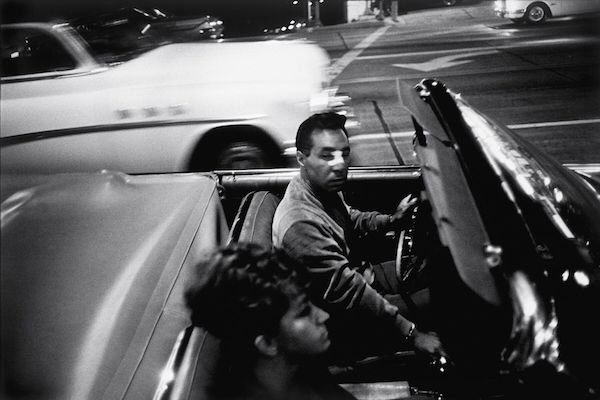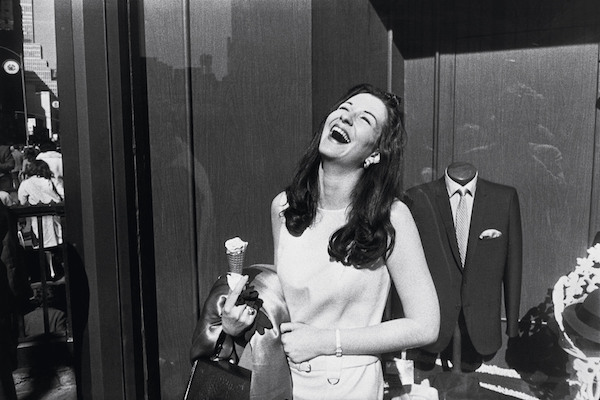Double Docs: A Pioneering Photographer and Defying Old Ideas About Intelligence
Two very worthwhile documentaries open this week in New York City: Sasha Waters Freyer’s Garry Winogrand: All Things Are Photographable is a portrait of the groundbreaking photographer responsible for some of the most memorable images of the 1950s through ’70s; Dan Habib’s Intelligent Lives follows three young adults who are challenging old ideas of what is achievable for those with intellectual disabilities.
Most of us have been intrigued by least one Garry Winogrand photo; perhaps “New York World’s Fair, 1964,” featuring several white women and one African-American man on a park bench; or the untitled image of a man upside down in midair on a city street. Winogrand’s photos, which capture nuance a well as overt movement, and the man “who turned street photography on its head” himself are both examined in All Things Are Photographable, an enjoyable doc full of images famous and lesser known. Along with testimonials from fellow photographers, museum curators and Mad Men creator Matthew Weiner, Freyer includes interview snippets with the late Winogrand himself, a gruff, outspoken Bronx native who often resisted analyzing his photographs, insisting that “all a photograph does is describe light on surface.” But Winogrand also admitted that a powerful image “makes you question what you think you know,” an apt description of his work.
New York Times photo editor Jeffrey Henson Scales likens Winogrand’s images to choreography because “everyone is dancing” in them; another expert says that the photographer’s work “makes chaos visible,” as there often seems to be some kind of commotion just out of frame. Like many of his generation, Winogrand, who was born in 1928, started as a photojournalist, taking on assignments for Life, Look and other periodicals. He later defied magazine conventions and took pictures for their own sake. Winogrand’s career wasn’t without bumps and the film covers the cool reception to one especially controversial shot as well as his ill-timed Women Are Beautiful collection, published at the height of the Women’s Movement (1975). Though Winogrand’s style fell out of favor, his Public Relations book (1977) is now considered a forerunner of post-modern imagery.
When Winogrand died at the age of 56 in 1984, he left behind thousands of rolls of undeveloped images, some of which were later presented in posthumous shows. His well-meaning admirers weren’t always as discerning as the photographer himself when it came to choosing which images to print. Nonetheless, his work remains unparalleled, described by former MoMA head of photography John Szarkowski as “made up of energy, ambition, desperate moments and unfamiliar beauty.”
Dan Habib’s moving Intelligent Lives makes a strong case for rethinking education for children with intellectual disabilities, as well as challenging the meaning of intelligence itself. The film opens with actor Chris Cooper narrating the story of his son Jesse, who was born with cerebral palsy. Based on the boy’s low scoring Stanford-Binet (standard IQ) test, Cooper and his wife were advised to institutionalize him. Instead they sent Jesse to “regular” schools, where he excelled. As Cooper says about traditional treatment of the intellectually challenged, “There are better ways, different ways.”
We see these ways through the experiences of three young adults striving to build a “normal” life despite their disabilities. Naieer is a student at the progressive Henderson Inclusive School in Boston, where he excels in art despite difficulty with verbal communication. Micah attends Syracuse University, where he is studying for a certificate in disability studies and pursuing romance with a fellow student. Finally, there’s Naomie, who works at a snack concession at the Rhode Island State House, with the help of a job coach.
Had the three been born 20 years earlier, they would probably have been institutionalized. The film looks at the history and distortion of the IQ test, whose creator, Alfred Binet, himself stressed its limitations. As shocking as it sounds today, the test was used on Ellis Island immigrants in the early 1900s, with approximately 80% of them subsequently deemed “feeble-minded.” Eugenics and forced sterilization would follow, with more recent atrocities like Willowbrook finally exposed and shut down. The film also shows the birth of the self-advocacy movement, which resulted in the Americans with Disabilities Act of 1990.
Thanks to the Henderson School, programs like Syracuse University’s “Inclusive U” and Rhode Island’s Fogarty Center; Naieer, Micah and Naomie all have support systems and channels to higher education and training. They also each have families who continue to fight for their rights. Naieer’s parents worry that their tall, African-American son who sometimes acts erratically might run into trouble; Micah’s sister, a special education teacher, talks about his decision to be his own legal guardian. And though Naomie’s parents are non-English-speaking Haitian immigrants, her protective older brother is heavily involved in her life, enabling her to find fulfilling work in a beauty school.
Intelligent Lives is an engaging and thought-provoking reminder that despite our progress in many areas of discrimination, those with intellectual disabilities are still waging a tough battle to live meaningful lives. Though the film’s three subjects are succeeding on their chosen paths, there’s a lot more to be done.
Garry Winogrand: Everything is Photographable opens on September 19 at Film Forum.
Intelligent Lives opens on September 21 at the Village East Cinema.
— Marina Zogbi






